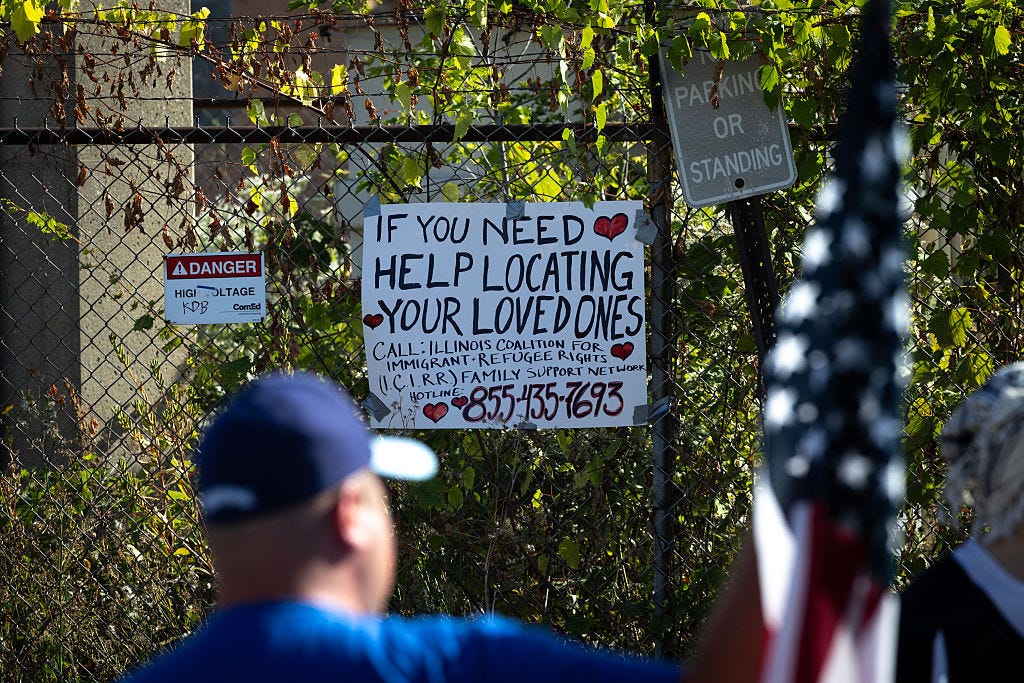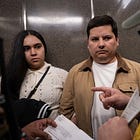MAKE IT MAKE SENSE: The Kavanaugh stop
Fighting the Supreme Court's dismantling of the Bill of Rights, and Bad Bunny's bigger idea of what it means to be American
BIGGER PICTURE: The Chicago raid in a check-your-papers America
Last Monday marked two decades of John Roberts’s leadership of the Supreme Court, a tenure that’s transformed the country, undoing so many of the advances made since the Civil War. And now, after clearing the way for Donald Trump’s second term and underwriting the transition to authoritarianism with a series of emergency rulings, the Roberts court appears set on rolling the clock back even further — current target, the Bill of Rights.
Case in point: in his concurrence in Noem v. Vasquez Perdomo — the shadow-docket ruling that threw aside longstanding constitutional protections and precedent to allow racial profiling — Justice Brett Kavanaugh waved off concerns that having gangs of federal agents figure out the Fourth Amendment for themselves might pose a problem for the people they detained:
[A]s for stops of those individuals who are legally in the country, the questioning in those circumstances is typically brief, and those individuals may promptly go free after making clear to the immigration officers that they are U.S. citizens or otherwise legally in the United States.
And thus, the “Kavanaugh Stop” came into being. Sure, Kavanaugh mused, there might occasionally be problems — excessive force, illegal search and seizure — but hey, those constitutional protections are still there to guarantee justice in the long term, right?
To the extent that excessive force has been used, the Fourth Amendment prohibits such action, and remedies should be available in federal court.
But as Damon Root at Reason has written, Kavanaugh here is forgetting about — or ignoring — his own earlier ruling that made it more or less impossible for somebody abused by federal agents to get such remedies.
That observation is laughable coming from Kavanaugh because Kavanaugh joined the Supreme Court’s 2022 majority opinion in Egbert v. Boule, which, as I noted at the time, “made it practically impossible to sue a federal officer over an alleged constitutional rights violation.”
And indeed, from the beginning of Stephen Miller’s mass deportation effort, U.S. citizens and noncitizen residents have been repeatedly ensnared in raids, as in the case of Alabama construction worker Leo Garcia Venegas —a U.S. citizen, who’s been detained twice by federal agents who refused to accept his identification as real and has since filed a damning lawsuit against the federal government.
It feels like there is nothing I can do to stop immigration agents from arresting me whenever they want… I just want to work in peace. The Constitution protects my ability to do that.
That’s bad enough, but this past week, federal agents further accelerated their deportation efforts in Chicago, even after already detaining U.S. citizens and making multiple arrests without probable cause in the supposedly “war-torn” city earlier in September. Following on Donald Trump’s threats to make American cities into military training grounds, they appear to have rolled the clock back even further on Fourth Amendment protections and turning Kavanaugh Stops into full-fledged Kavanaugh Raids with a massive military-style assault on a South Chicago apartment building:
Armed federal agents in military fatigues busted down their doors overnight, pulling men, women and children from their apartments, some of them naked, residents and witnesses said. Agents approached or entered nearly every apartment in the five-story building, and U.S. citizens were among those detained for hours.
During the midnight raid — in which up to 300 agents stormed the building, some rappelling from helicopters and firing flashbang grenades — 37 people were taken away, apartments were ransacked, children were zip-tied and separated from their parents. No evidence was presented, nor were warrants produced, and days after the raid, the people taken by agents have still not been identified or charged.
The reason for that overwhelming show of force? To add insult to injury, the Department of Homeland Security appears to have used the raid to make content.
Another lawsuit, brought by a group of people arrested without probable cause in Washington D.C. earlier this year, none of whom were allowed to “promptly go free” after presenting identification, looks to stop such abuses, which, for now, continue across the country, without a clear — even if they remain invisible to Justice Kavanaugh.
And as we talked about here in the newsletter earlier this month, until that can be changed, Americans are living in a very different kind of society than the one they’ve come to expect. A society very different from the one the founders imagined and fought for.
The law of the land, in the wake of this ruling, seems to be: “Show us your papers.” The holding, at bottom, is that the burden of belonging has quietly shifted. It is now on you, at any moment, when the masked men come, to prove you are lawfully here. As the factors of suspicion pile up, we will soon all be illegal until proven citizen.
But even if the federal government ignores it, and even if the Supreme Court treats it as an abstraction, the law and the rule of law still matter. In the lower courts at least, judges realize that. The legal fight against what the highest court has enabled and what the current regime is doing will doubtless be long and difficult — and it will take the kind of courage in applying the law that U.S. District Court Judge Karin Immergut has shown in issuing restraining orders stopping Trump from deploying National Guard troops in Portland, Oregon.
There was, about 250 years ago, a revolution fought over these issues, from “obstructing the Laws for Naturalization of Foreigners” to sending “hither swarms of Officers to harass our people” to rendering “the Military independent of and superior to the Civil power.” Those so deeply committed to the preservation of the American experiment — whether they serve on the Supreme Court or not — would do well to learn more about that. It’s written down somewhere.
SOMETHING DIFFERENT: A bigger definition of America
Bad Bunny — by most measures, the biggest pop star in the world — might seem a natural choice to play the Super Bowl halftime show. But things being as they are, the decision has incurred the wrath of the MAGA faithful, who’ve gone so far as to turn on the NFL. Why? The uproar is supposedly over the fact that he plans to sing in Spanish. But perhaps it’s because, as a Puerto Rican, he represents a broader idea of what it means to belong, in the United States and to the wider world. That means, sometimes, being nostalgic for different things than your neighbors, and taking the time to explain and share — as Bad Bunny did when he hosted Saturday Night Live this weekend, and led the cast through a skit in the style of the Mexican kids’ show El Chavo Del Ocho, a mainstay across Latin America — including a certain Spanish-speaking territory of the U.S.
The Ink is powered by readers like you. Help us stand up for independent media that isn’t afraid to tell the truth by joining us today.
Your support is how we keep the lights on, pay our writers and editors a fair wage, and build the new media we all deserve. When you subscribe, you help us reach more people. Join us today, or if you are already a member, give a gift or group subscription.





As a former teacher I can tell you they’ve been treating us as if the world of education existed outside of America, breaking laws to shut us up so you won’t know what they’re doing to our schools. I didn’t realize it was fascism until I saw it takeover government. I knew it was wrong and that it would end democracy. I also knew teachers’ fear of dealing with our dictatorial leaders led to school shootings. Meanwhile, everyone thinks they’re just about guns when it’s so much more.
Please look into our education system by listening to the whistleblowing teachers at WhiteChalkCrime.com and EndTeacherAbuse.org. This is where the rats entered our society and we all know what to do when we find rats in our home. We figure out how they got in and seal the entrance. We can do that as school boards have most of the power over our schools.
Not only will we take our schools back and end school shootings, but we will have discovered the issue that both sides will get behind.
We’re a country that’s lost faith in our leaders. Think about how people will feel if a leader fixes our school problem. They stole our schools from us and both parties remained clueless. This is how we fell apart.
One can help save democracy if they look into our schools. These teacher whistleblowers have been crying out for that since 2002. Think what we could have avoided if these teachers had even a little power. Since they had none, what happened to them is now happening to all of us.
First they came for the teachers and ….
What happened to the troops? Did none protest this outrage?